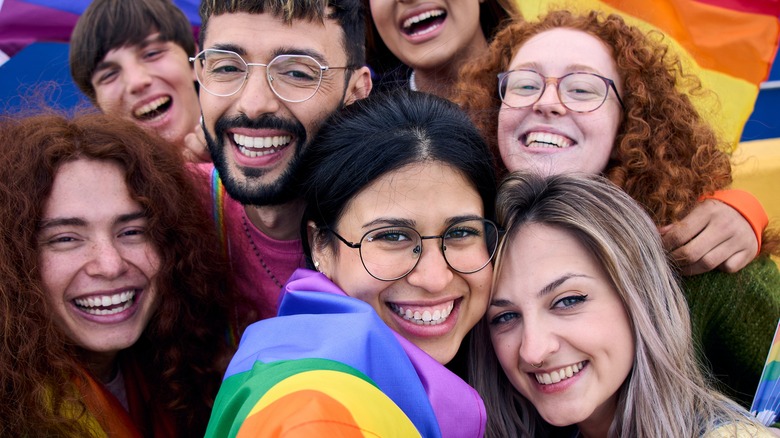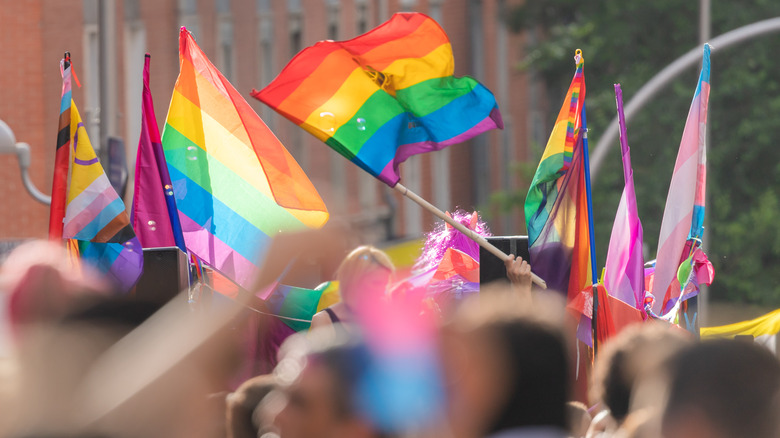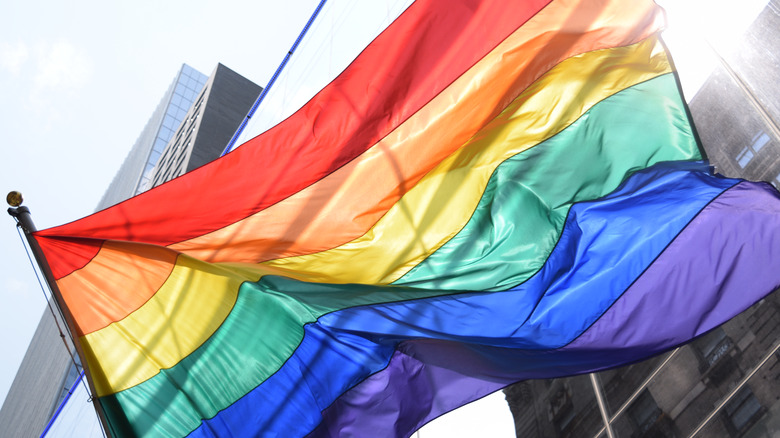Why LGBTQ+ History Month Is Celebrated In October
Several significant LGBTQ+ rights milestones happened in the month of October, and as a result, it was declared LGBTQ+ History Month in 1994, according to LGBTHistoryMonth.com. The first March on Washington for Lesbian and Gay Rights happened on October 14, 1979, and the second on October 1987. In 1988, activists Jean O'Leary and Robert H. Eichberg designated the anniversary of the second — October 11 — as National Coming Out Day. Meanwhile, several additional LGBTQ+ rights marches on Washington have happened on different dates since then.
In 1994, LGBTQ+ History Month founder Rodney Wilson opened up about his sexuality to the high school history class he taught, and by doing so he became the first openly-gay teacher in the state's history. Around that same time, Wilson and colleagues proposed October to celebrate LGBTQ+ history in classrooms each year — corresponding with the important dates in LGBTQ+ history mentioned, but also because schools were in session, according to the Advocate.
Referring to the month he helped start, Wilson told the Los Angeles Times in 1995, "[A]llow me to be an openly gay role model for gay kids and for straight kids. And, hopefully, people will realize that gay and lesbian people are average American citizens." From that point on, as news of Wilson's celebration spread nationwide, the concept was supported by many — and also faced a great deal of controversy.
LGBTQ+ History Month growth and backlash
With LGBTQ+ History Month founder Rodney Wilson and his colleagues' proposal complete in 1994, the idea was endorsed by many state government officials across the U.S. and several gay and lesbian advocacy groups like GLAAD. Newsweek was among the first major media outlets to cover the event in 1995, and that same year, the National Education Association (NEA) included LGBTQ+ History Month among other similar month-long observances. After the NEA vote, one early opponent — conservative political advocate Phyllis Schlafly — urged the labor union to reject the idea. The next year, the NEA backtracked. Also in 1995, one parent told the LA Times that while Wilson can be gay, "We just don't want him to teach it to our kids."
With no central organizing body, LGBTQ+ History Month still grew despite pushback. A major step in the history of LGBTQ+ History Month happened in 2006, when Philadelphia's Equality Forum created LGBTHistoryMonth.com, providing resources for those interested in observing the occasion. In 2012, two school districts also officially recognized the event: Florida's Broward County and Los Angeles, CNN reported that year. At that time, Los Angeles school district diversity coordinator Judy Chiasson said, "Schools have an obligation to present the diversity of our communities. ... [W]e want all of our families to be recognized in our schools."
Worldwide celebrations and continued controversy
As of 2023, Rodney Wilson's concept for a month dedicated to LGBTQ+ history is observed across the world, although it only takes place in October in the United States, Canada, and Australia. Other countries celebrate LGBTQ+ history in their own way on different dates. Even still, the annual event and it's associated observances remain controversial. In 2022, the Miami-Dade County Public School Board voted against making October an official LGBTQ+ History Month in its district, NPR reported that year.
Back in 2015, Wilson spoke with his alma mater — the University of Missouri–St. Louis — about his decision to come out when he did, the month he helped start, and its legacy. Wilson told UMSL Daily, "For many reasons, it became clear to me that I had to live an open life, not least of which was that LGBT History Month was beginning to emerge as a national celebration. How could I organize a national event about gay history and not be open at work about the entirety of who I am? I also believed that the greatest act of advocacy for civil rights for LGBT Americans is the act of coming out. It is a political act."


